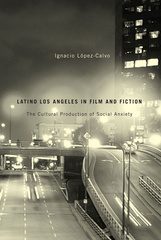Broken Souths
Latina/o Poetic Responses to Neoliberalism and Globalization
The University of Arizona Press
Broken Souths offers the first in-depth study of the diverse field of contemporary Latina/o poetry. Its innovative angle of approach puts Latina/o and Latin American poets into sustained conversation in original and rewarding ways. In addition, author Michael Dowdy presents ecocritical readings that foreground the environmental dimensions of current Latina/o poetics.
Dowdy argues that a transnational Latina/o imaginary has emerged in response to neoliberalism—the free-market philosophy that underpins what many in the northern hemisphere refer to as “globalization.” His work examines how poets represent the places that have been “broken” by globalization’s political, economic, and environmental upheavals. Broken Souths locates the roots of the new imaginary in 1968, when the Mexican student movement crested and the Chicano and Nuyorican movements emerged in the United States. It theorizes that Latina/o poetics negotiates tensions between the late 1960s’ oppositional, collective identities and the present day’s radical individualisms and discourses of assimilation, including the “post-colonial,” “post-national,” and “post-revolutionary.” Dowdy is particularly interested in how Latina/o poetics reframes debates in cultural studies and critical geography on the relation between place, space, and nature.
Broken Souths features discussions of Latina/o writers such as Victor Hernández Cruz, Martín Espada, Juan Felipe Herrera, Guillermo Verdecchia, Marcos McPeek Villatoro, Maurice Kilwein Guevara, Judith Ortiz Cofer, Jack Agüeros, Marjorie Agosín, Valerie Martínez, and Ariel Dorfman, alongside discussions of influential Latin American writers, including Roberto Bolaño, Ernesto Cardenal, David Huerta, José Emilio Pacheco, and Raúl Zurita.
Dowdy argues that a transnational Latina/o imaginary has emerged in response to neoliberalism—the free-market philosophy that underpins what many in the northern hemisphere refer to as “globalization.” His work examines how poets represent the places that have been “broken” by globalization’s political, economic, and environmental upheavals. Broken Souths locates the roots of the new imaginary in 1968, when the Mexican student movement crested and the Chicano and Nuyorican movements emerged in the United States. It theorizes that Latina/o poetics negotiates tensions between the late 1960s’ oppositional, collective identities and the present day’s radical individualisms and discourses of assimilation, including the “post-colonial,” “post-national,” and “post-revolutionary.” Dowdy is particularly interested in how Latina/o poetics reframes debates in cultural studies and critical geography on the relation between place, space, and nature.
Broken Souths features discussions of Latina/o writers such as Victor Hernández Cruz, Martín Espada, Juan Felipe Herrera, Guillermo Verdecchia, Marcos McPeek Villatoro, Maurice Kilwein Guevara, Judith Ortiz Cofer, Jack Agüeros, Marjorie Agosín, Valerie Martínez, and Ariel Dorfman, alongside discussions of influential Latin American writers, including Roberto Bolaño, Ernesto Cardenal, David Huerta, José Emilio Pacheco, and Raúl Zurita.
‘A just account of the power of poetry to reimagine the social-political structures that confine, destroy, and/or displace entire populations. . . . This work serves as the literary complement to the treatises of Naomi Klein, Greg Gandin, and Stephen Kinzer, to name a few.’—Choice Reviews
‘Adds a much-needed, meticulous, and nuanced argument to the field.’—American Literary History
‘The book is characterized . . . [by an] invigorating bubbling, thick abundance of relational, critical, and informational texture.’—American Literature
‘Broken Souths succinctly stated is a magnificent piece of writing in terms of originality, sophistication, and scope.’—Francisco A. Lomelí, co-author of Imagined Transnationalism: U.S. Latino/a Literature, Culture, and Identity
Michael Dowdy is an assistant professor of English at Hunter College of the City University of New York. He is the author of American Political Poetry into the 21st Century and a chapbook of poems, The Coriolis Effect.
Acknowledgments
Introduction. Contesting the Counter-Revolution: A Latina/o Literary Geography of the Neoliberal Era
1. Hemispheric Otherwises in the Shadow of “1968”: Martín Espada’s Zapatista Poems
2. Molotovs and Subtleties: Juan Felipe Herrera’s Post-Movement Norteamérica
3. Against the Neoliberal State: Roberto Bolaño’s “Country” of Writing and Martín Espada’s “Republic” of Poetry
4. “Andando entre dos mundos”: Maurice Kilwein Guevara’s and Marcos McPeek Villatoro’s Appalachian Latino Poetics
5. “migration . . . is not a crime”: Puerto Rican Status and “T-shirt solidarity” in Judith Ortiz Cofer, Victor Hernández Cruz, and Jack Agüeros
6. Godzilla in Mexico City: Poetics of Infrastructure in José Emilio Pacheco and Roberto Bolaño
Coda. “Too much of it”: Marjorie Agosín’s and Valerie Martínez’s Representations of Femicide in the Maquila Zone
Notes
Bibliography
Index


















